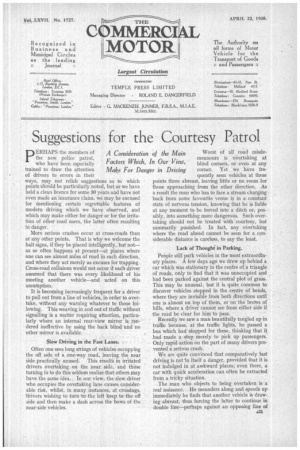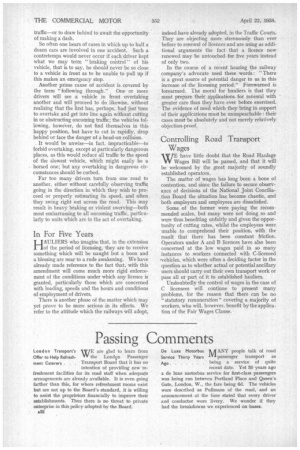Suggestions for the Courtesy Patrol
Page 33

Page 34

If you've noticed an error in this article please click here to report it so we can fix it.
PERHAPS the members of the new police patrol, who have been especially trained to draw the attention of drivers to errors in their ways, may not relish suggestions as to which points should be particularly noted, but as we have held a clean licence for some 30 years and have not even made an insurance claim, we may be excused for mentioning certain regrettable features of modern driving which we have observed, and which may make either for danger or for the irritation of other road users, the latter often resulting in danger.
More serious crashes occur at cross-roads than at any other points. That is why we welcome the halt signs, if they be placed intelligently, but not— as so often happens at present—at places where one can see almost miles of road in each direction, and where they act merely as excuses for trapping. Cross-road collisions would not occur if each driver assumed that there was every likelihood of his meeting another vehicle—and acted on this assumption.
It is becoming increasingly frequent for a driver to pull out from a line of vehicles, in order to overtake, without any warning whatever to those following. This weaving in and out of traffic without signalling is a matter requiring attention, particularly where an internal rear-view mirror is rendered ineffective by using the back blind and no other mirror is available.
Slow Driving in the Fast Lanes.
Often one sees long strings of vehicles occupying the off side of a one-way road, leaving the near side .practically unused. This resultS' in irritated drivers overtaking . on the near side, and those turning in to do this seldom realize that others may have the same idea. In our view, the slow driver who occupies the overtaking lane causes considerable risk, whilst, in many instances, at crossings, 'drivers wishing to turn to the left keep to the off side and then make a dash across the bows of the near-side vehicles. Worst of all road misdemeanours is overtaking at blind corners, or even at any corner. Yet we have frequently seen vehicles at these points three abreast, leaving little or no room for those approaching from the other direction. As a result the man who has to face a stream charging back from some favourite venue is in a constant state of nervous tension, knowing that he is liable at any moment to be forced into a ditch or, possibly, into something more dangerous. Such overtaking should not be treated with courtesy, but summarily punished. In fact, any overtaking where the road ahead cannot be seen for a considerable distance is careless, to say the least.
• Lack of Thoughi in Parking.
People still park vehicles in the most extraordinary places. A few days ago we drew up behind a car which was stationary in the centre of. a triangle of roads, only to find that it was unoccupied and had been parked against the central plot of grass. This may be unusual, but it is quite common to discover vehicles stopped in the centre of bends, where they are invisible froM both directions until one is almost on top of them, or on the brows of hills, where a driver cannot see from either side if the road be clear for him to pass.
Recently we saw a man beautifully tangled up in traffic because, at the traffic lights, he passed a bus which had stopped for these, thinking that it had made a stop merely to pick up passengers. Only rapid action on the part of many drivers prevented a serious crash.
We are 'quite convinced that comparatively fast driving is not In itself a danger, provided that it is not indulged in at awkward places; even there, a car with quick acceleration can often be extracted from a tricky situation.
• The man who objects to being overtaken is a real nuisance. He meanders along and speeds up immediately he finds that another vehicle is drawing abreast, thus forcing the latter to continue in double line—perhaps against an opposing line of traffic—or to draw behind to await the opportunity of making a dash.
So often one hears of cases in which up to half a dozen cars are involved in one accident. Such a contretemps would never occur if each driver kept what we may term "braking control" of his vehicle, that is to say, he should never be so close to a vehicle in front as to be unable to pull up if this makes an emergency stop.
Another prime cause of accident is covered by the term "following through." One or more drivers will see a vehicle in front overtaking another and will proceed to do likewise, without realizing that the first has, perhaps, had just time to overtake and get into line again without cutting in or obstructing oncoming traffic; the vehicles following, however, do not find themselves in this happy position, but have to cut in rapidly, drop behind or face the danger of a head-on collision.
It would be unwise—in fact, impracticable—to forbid overtaking, except at particularly dangerous places, as this would reduce all traffic to the speed of the slowest vehicle, which might easily be a horsed one; but any overtaking in dangerous circumstances should be curbed.
Far too many drivers turn from one road to another, either without carefully observing traffic going in the direction in which they wish to proceed or properly estimating its speed, and often they swing right out across the road. This may result in heavy braking or violent swerving—both most embarrassing to all oncoming traffic, particularly to units which are in the act of overtaking.
In For Five Years
LIAULIERS who imagine that, in the extension 1 !of the period of licensing, they are to receive something which will be naught but a boon and a blessing are near to a rude awakening. We have already made reference to the fact that, with this amendment will come much more rigid enforcement of the conditions under which any licence is granted, particularly those which are concerned with loading, speeds and the hours and conditions of employment of drivers.
There is another phase of the matter which may yet prove to be more serious in its effects. We refer to the attitude which the railways will adopt, indeed have already adopted, in the Traffic Courts. They are objecting more strenuously than ever before to renewal of licences and are using as additional arguments. the fact that a licence now renewed may be untouched for five years instead of only two.
In the course of a recent hearing the railway company's advocate used these words: "There is a great source of potential danger to us in this increase of the licensing period." Forewarned is forearmed. The moral for hauliers is that they must prepare their applications for renewal with greater care than they have ever before exercised. The evidence of need which they bring in support of their applications must be unimpeachable : their cases must be absolutely and not merely relatively objection-proof.
Controlling Road Transport Wages
WE have little doubt that the Road Haulage Wages Bill will be passed, and that it will be welcomed by the great majority of soundly established operators.
The matter of wages has long been a bone of contention, and since the failure to secure observance of decisions of the National Joint Conciliation Board the situation has become chaotic, and both employers and employees are dissatisfied.
Some of the former were paying the recommended scales, but many were not doing so and were thus benefiting unfairly and given the opportunity of cutting rates, whilst the employees were unable to comprehend their position, with the result that there has been constant friction. Operators under A and B licences have also been concerned at the low wages paid in so many instances to workers connected with C-licensed ,vehicles, which were often a deciding factor in the question as to whether actual or potential ancillary users should carry out their own transport work or pass all or part of it to established hauliers.
Undoubtedly the control of wages in the case of C licensees will continue to present many problems, for the reason that there can be no "statutory remuneration" covering a majority of workers, who will, however, benefit by the application of the Fair Wages Clause.


































































































